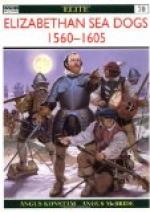Cabot settled in Bristol, where the still existing guild of Merchant-Venturers was even then two centuries old. Columbus, writing of his visit to Iceland, says, ’the English, especially those of Bristol, go there with their merchandise.’ Iceland was then what Newfoundland became, the best of distant fishing grounds. It marked one end of the line of English sea-borne commerce. The Levant marked the other. The Baltic formed an important branch. Thus English trade already stretched out over all the main lines. Long before Cabot’s arrival a merchant prince of Bristol, named Canyng, who employed a hundred artificers and eight hundred seamen, was trading to Iceland, to the Baltic, and, most of all, to the Mediterranean. The trade with Italian ports stood in high favor among English merchants and was encouraged by the King; for in 1485, the first year of the Tudor dynasty, an English consul took office at Pisa and England made a treaty of reciprocity with Tuscany.
Henry VII, first of the energetic Tudors and grandfather of Queen Elizabeth, was a thrifty and practical man. Some years before the event about to be recorded in these pages Columbus had sent him a trusted brother with maps, globes, and quotations from Plato to prove the existence of lands to the west. Henry had troubles of his own in England. So he turned a deaf ear and lost a New World. But after Columbus had found America, and the Pope had divided all heathen countries between the crowns of Spain and Portugal, Henry decided to see what he could do.
* * * * *
Anglo-American history begins on the 5th of March, 1496, when the Cabots, father and three sons, received the following patent from the King:
Henrie, by the grace of God, King of England and France, and Lord of Irelande, to all, to whom these presentes shall come, Greeting—Be it knowen, that We have given and granted, and by these presentes do give and grant for Us and Our Heyres, to our well beloved John Gabote, citizen of Venice, to Lewes, Sebastian, and Santius, sonnes of the sayde John, and to the heires of them and every of them, and their deputies, full and free authoritie, leave, and Power, to sayle to all Partes, Countreys, and Seas, of the East, of the West, and of the North, under our banners and ensignes, with five shippes, of what burden or quantitie soever they bee: and as many mariners or men as they will have with them in the saide shippes, upon their owne proper costes and charges, to seeke out, discover, and finde, whatsoever Iles, Countreyes, Regions, or Provinces, of the Heathennes and Infidelles, whatsoever they bee, and in what part of the worlde soever they bee, whiche before this time have been unknowen to all Christians. We have granted to them also, and to every of them, the heires of them, and every of them, and their deputies, and have given them licence to set up Our banners and ensignes in every village, towne, castel, yle, or maine lande, of them newly founde. And that the aforesaide John and his sonnes, or their heires and assignes, may subdue, occupie, and possesse, all such townes, cities, castels, and yles, of them founde, which they can subdue, occupie, and possesse, as our vassailes and lieutenantes, getting unto Us the rule, title, and jurisdiction of the same villages, townes, castels, and firme lande so founde.




